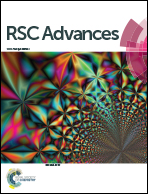Intravenous administration of trans-resveratrol-loaded TPGS-coated solid lipid nanoparticles for prolonged systemic circulation, passive brain targeting and improved in vitro cytotoxicity against C6 glioma cell lines
Abstract
trans-Resveratrol (RSV), a natural molecule isolated from red wine, is widely known for several therapeutic potentials. RSV is proved for cardioprotective, vasodilation, anti-inflammatory, and anticancer effects. Recently, anticancer potential against glioma cells has also been reported. However, the clinical application of RSV in glioma treatment is largely limited because of its rapid metabolism and elimination from systemic circulation thereby exhibiting low biological half-life and poor brain distribution as well. Therefore, the main objective of this study was to enhance the circulation time, biological half-life and passive brain targeting of RSV using D-α-tocopheryl polyethylene glycol 1000 succinate (TPGS)-coated solid lipid nanoparticles (RSV-TPGS-SLN). RSV-TPGS-SLN formulations were prepared by a solvent emulsification evaporation method and evaluated for several nanoparticulate characteristics. In vitro anticancer potential and cellular internalization of nanoparticles were also investigated in C6 glioma cell lines. Pharmacokinetics and biodistribution studies were carried out following intravenous administration in healthy Charles Foster rats. RSV-TPGS-SLN showed significantly higher in vitro cytotoxicity against C6 glioma cell lines and excellent cellular internalization. RSV-TPGS-SLN showed 11.12 and 9.37 times higher area under the curve and plasma half-life than RSV solution, respectively. Moreover, brain distribution of RSV-TPGS-SLN was found to be 9.23 times higher in comparison to that of RSV alone. Thus, we anticipate that the RSV-TPGS-SLN formulation can be applied as a potential tool for improving circulation time, biological half-life and passive brain targeting of RSV, thereby being immensely useful in the treatment of glioma.


 Please wait while we load your content...
Please wait while we load your content...